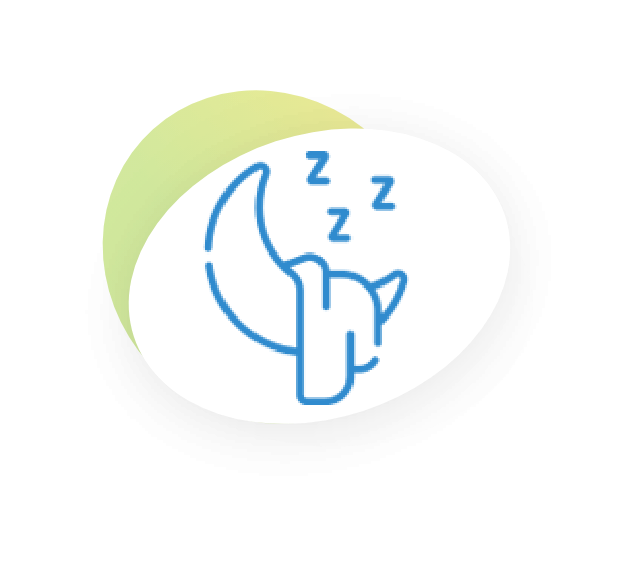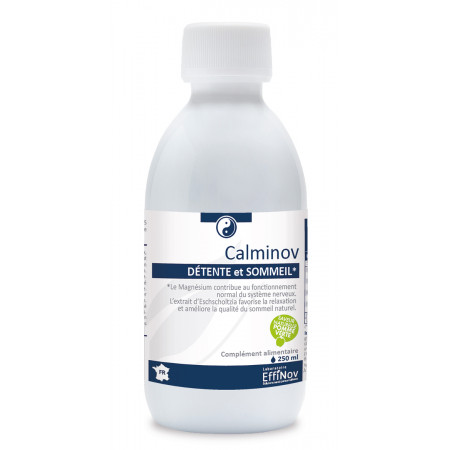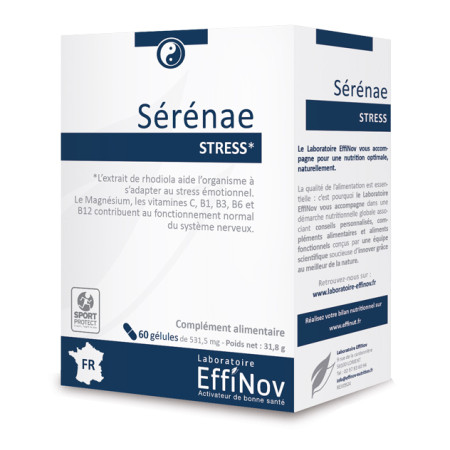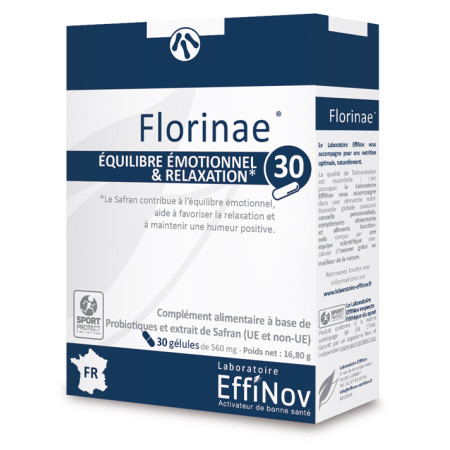

SLEEP / STRESS
Our dietary supplements
Stress factors and sleep disorders are numerous and deplete our energy and nutritional reserves. Find here our selection of products to find sleep and serenity.
Dietary supplement sleep | dietary supplement stress
YOUR NEEDS
Frequently asked questions
One sheep, two sheep, three sheep, ..., a hundred sheep. Counting sheep is not always a very effective sleeping technique. But how do you sleep well? Here are 5 tips for quickly falling into Morpheus' arms :
- Eat light and balanced : Good nutrition is essential to sleep well. It is advisable to avoid heavy dinners before going to bed. It is also advisable to limit animal proteins in the evening because it reduces the synthesis of serotonin (hormone of appeasement and relaxation) making it difficult to fall asleep. Prefer foods that are sources of tryptophan (rice, legumes, bananas). Indeed, tryptophan is an essential amino acid that is used in the synthesis of serotonin, a precursor to melatonin (sleep hormone).
- Avoid stimulants after 4pm : Coffee and tea delay sleep and can also affect sleep quality and duration.
- Be physically active : Exercise is likely to increase melatonin production. Physical activity therefore facilitates sleep and restorative sleep. However, it is advisable to provide an interval of 3 to 4 hours between a workout and bedtime to avoid disturbed sleep.
- Establish a sleep ritual : Our body is formed to follow a characteristic rhythm. This is called the biological clock. If you are having trouble falling asleep, it may be interesting to find daily things to do before going to sleep (reading, listening to soft music…).
- Avoid screens before bedtime : The blue light emitted by screens (smartphones, tablets, television, etc.) reduces the production of melatonin, a hormone that promotes sleep. In addition, blue light disrupts our «biological clock» and can cause a sleep disorder.
Discover our relaxation and sleep complex Calminov
A good night’s sleep consists of 3 to 5 cycles. A night is a sequence of cycles. The length of a cycle differs by age.
Did you know ? The average sleep time of the French is 6:42.
A sleep cycle lasts about 90 minutes. A cycle consists of alternating light, deep and REM sleep :
1. Light slow sleep : This first phase of sleep is characterized by a state of drowsiness. During this phase we are likely to wake up easily. We go into a half-sleep where we hear noises without having the energy to react. Brain activity is slower. However the slightest noise can wake us up !
2. Deep slow sleep : During this phase of sleep, our body is cut off from the world, we no longer hear anything. We sleep deeply. The body rests, the muscles are relaxed, the heart slows down and the body temperature drops gently.
3. Paradoxical sleep : known as REM sleep (Rapid Eye Movement), it corresponds to a period during which our brain activity is close to awakening. On the contrary, our muscles are completely relaxed and our body is relaxed.
Discover our relaxation and sleep complex Calminov
Sleep is health ! Well yes! Sleep is crucial, it is the moment when our vital functions are regulated and our immune system is strengthened. However, sometimes some people suffer from sleep disorders. In France, 1/3 of people are affected by sleep disorders and poor sleep can have disastrous consequences:
- Insomnia : It is the most common sleep disorder. Insomnia affects about 30% of the population. It is characterized by difficulty getting enough sleep and therefore poor quality sleep. These disorders are often transient. However, it can happen that they persist, we then speak of chronic insomnia.
- Sleep apnea : Obstructive sleep apnea-hypopnea syndrome (SAHOS) is a relatively common cause of sleep disorders. This disorder is characterized by breathing breaks (apnea) that affect the rhythm of sleep.
- Hypersomnias and narcolepsy : The best known form of hypersomnia is narcolepsy, also known as Gelineau disease. It is characterized by excessive drowsiness during the day. To this can be added cataplexy (sudden loss of muscle tone), sleep paralysis and especially poor quality sleep.
- Circadian rhythm disorders : The human body has its own “biological clock”. Circadian rhythm disorders are sleep disorders related to a dysfunction of the biological clock.
- Parasomnias : These are abnormal behavioral disorders during deep slow sleep and REM sleep. During the phase of deep slow sleep, this is characterized by night terrors, sleepwalking, bruxism (grinding of the teeth). During REM sleep, this disorder results in violent movements, not articulated words.
Discover our relaxation and sleep complex Calminov
Oral presentations in public, professional meetings, exams, etc. It’s not easy to manage your stress in these situations ! However, there are several anti-stress techniques that can simplify our life. So how to manage stress in 4 tips ?
- Organize : It is the organization that creates stress problems. Poor organization can create a feeling of tension, which is stressful. Make yourself a list of things to do so you don’t feel overwhelmed by events !
- Be positive : Positiver can sometimes keep us from getting overwhelmed by stress. So take a step back, and try to distinguish between a trivial problem and an important one.
- Have a healthy lifestyle : There’s nothing better than exercising to relieve stress. Indeed, during physical activity endorphins (happiness hormones) are released. Good stress management also involves diet. Indeed, the diet must be varied and balanced, do not forget that it is important to consume 5 fruits and vegetables a day. In times of intense stress (chronic stress), it is important to ensure its intake of Magnesium. Choose foods rich in magnesium such as almonds, bananas, lentils or chocolate !
- Learn to decompress : In order to manage stress optimally, first think about your breathing. In addition, it may be useful to perform relaxation sessions (yoga, sophrology, massage, etc.) to reduce the effects of stress.
Discover our complex Florinae complex for “incoming stress” (stomach aches, anxiety…)
Discover our complex Sérénae against «outgoing stress» (nervousness, sweet impulses, etc.)
For more advice, do not hesitate to contact us by email a contact@effinov-nutrition.fr or by phone at 02.97.83.60.94
Belly ball, dizziness, sweaty hands, palpitations, … Each of us has already felt stressed. Stress is a normal reaction of our body that allows us to cope with emergencies and danger. However, stress can sometimes become a real brake in our life, which can harm physical and mental balance.
Stress usually results in physical disorders, which can be characterized by digestive disorders (vomiting, nausea, stomach aches, etc.). It can also be characterized by cardiovascular disorders (tachycardia, palpitations, etc.). Stress-related symptoms can also result in shortness of breath, hives, red patches on the body or even paresthesia (tingling).
Stress can also lead to psychological symptoms such as attention disorders, memory and concentration difficulties. When you experience stress, you can also frequently feel fatigue.
When stress is long-lasting, it is called chronic stress. In the long term, chronic stress can have harmful effects (depression, hypertension, insulin resistance and disruption of blood lipid metabolism (cholesterol, triglycerides, etc.)) on health.
Attention ! It is important not to confuse acute stress with chronic stress. Acute stress is caused by a specific and punctual event (exams, job interviews, etc.), while chronic stress refers to a prolonged and repeated feeling of stress.
Discover our complex Florinae complex for “incoming stress” (stomach aches, anxiety…)
Discover our complex Sérénae against «outgoing stress» (nervousness, sweet impulses, etc.)
For more advice, do not hesitate to contact us by email a contact@effinov-nutrition.fr or by phone at 02.97.83.60.94







